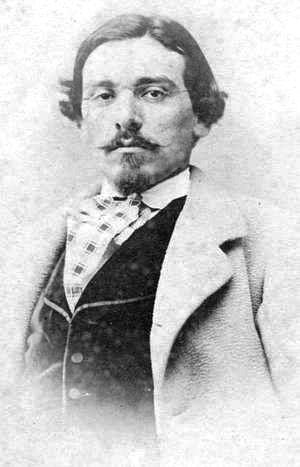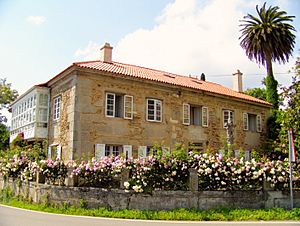Eduardo Pondal facts for kids
Quick facts for kids
Eduardo Pondal
|
|
|---|---|
 |
|
| Born | Eduardo María González-Pondal Abente February 8, 1835 Ponteceso, Galicia, Spain |
| Died | March 8, 1917 (aged 82) A Coruña, Galicia, Spain |
| Occupation | Poet |
| Nationality | Galician |
| Period | Romanticism |
Eduardo María González-Pondal Abente (born February 8, 1835 – died March 8, 1917) was a famous poet from Galicia, Spain. He wrote his poems in both the Galician and Spanish languages.
Early Life and Studies
Eduardo Pondal came from a noble family, the youngest of seven children. When he was nine, he started studying Latin at a school owned by a relative. Later, in 1848, he moved to Santiago de Compostela. There, he studied Philosophy and then Medicine at the university.
As a student, he often visited the Liceo de Santo Agostiño. This was a place where people held literary debates. He became known as a poet during an important student event in 1856. This event was a banquet organized by students who supported liberal ideas.
Becoming a Poet
In 1860, Pondal finished his studies. He began working as a doctor for the Spanish Army in Ferrol. Around this time, he also published his first poem in Galician. It was called A Campana de Anllóns (The Bell of Anllóns).
In 1861, he got a government job in Asturias. However, he soon left this job and his career as a doctor. He decided to retire and returned to his family home. From there, he often traveled to Santiago de Compostela and A Coruña.
In A Coruña, he visited a special library called A Cova Céltica (The Celtic Cave). Here, he met and debated with other important thinkers and writers. Through one of them, Manuel Murguía, Pondal learned about the poetry of James Macpherson. This inspired him to become the "bard" (a poet and storyteller) of the Galician nation. He wanted to guide and interpret the path for his people through his poetry.
Important Works and Legacy
In 1877, Pondal published Rumores de los pinos (Whispers of the Pines). This book was a collection of 21 poems in both Galician and Spanish. It later became the basis for his more famous work, Queixumes dos pinos (Laments of the Pines), published in 1886.
One of the poems in Queixumes dos pinos was "Os pinos" (The Pines). This poem became the lyrics for the national anthem of Galicia. The music for the anthem was composed by Pascual Veiga.
Pondal saw himself as a "poet of freedom." He wanted to inspire his people and help them rise up. He imagined a past for Galicia that was full of freedom and independence. He tried to bring this past back to life through his poetry.
At that time, much of the old Galician-Celtic mythology was lost. So, Pondal had to imagine and create parts of it himself. He used ideas from other ancient poems and studies. He invented characters like "o Heroe" (the hero) and "o Bardo" (the bard). He even created historical figures, like Ourens, whose name he hoped would become the basis for the city of Ourense.
Pondal also worked to bring back the Galician language. At the time, it was not highly regarded in society. His poems often focused on nature and women. He tried to blend the everyday language of Galicia with more scholarly words and sentence structures.
He also attempted to write a long epic poem called Os Eoas. This poem was about the discovery of the Americas. However, he was never fully happy with it and only published an early version in 1858.
Eduardo Pondal passed away in A Coruña on March 8, 1917. He was buried in the San Amaro cemetery. In 1965, Galician Literature Day (Día das Letras Galegas) was dedicated to him. This honor celebrates important figures in Galician literature.
Works
- 1862: "A Campana de Anllóns (El canto de un Brigante)"
- 1877: Rumores de los pinos
- 1886: Queixumes dos pinos
- 1895: A campana de Anllóns
- 2005: Os Eoas
See also
 In Spanish: Eduardo Pondal para niños
In Spanish: Eduardo Pondal para niños
 | Isaac Myers |
 | D. Hamilton Jackson |
 | A. Philip Randolph |


